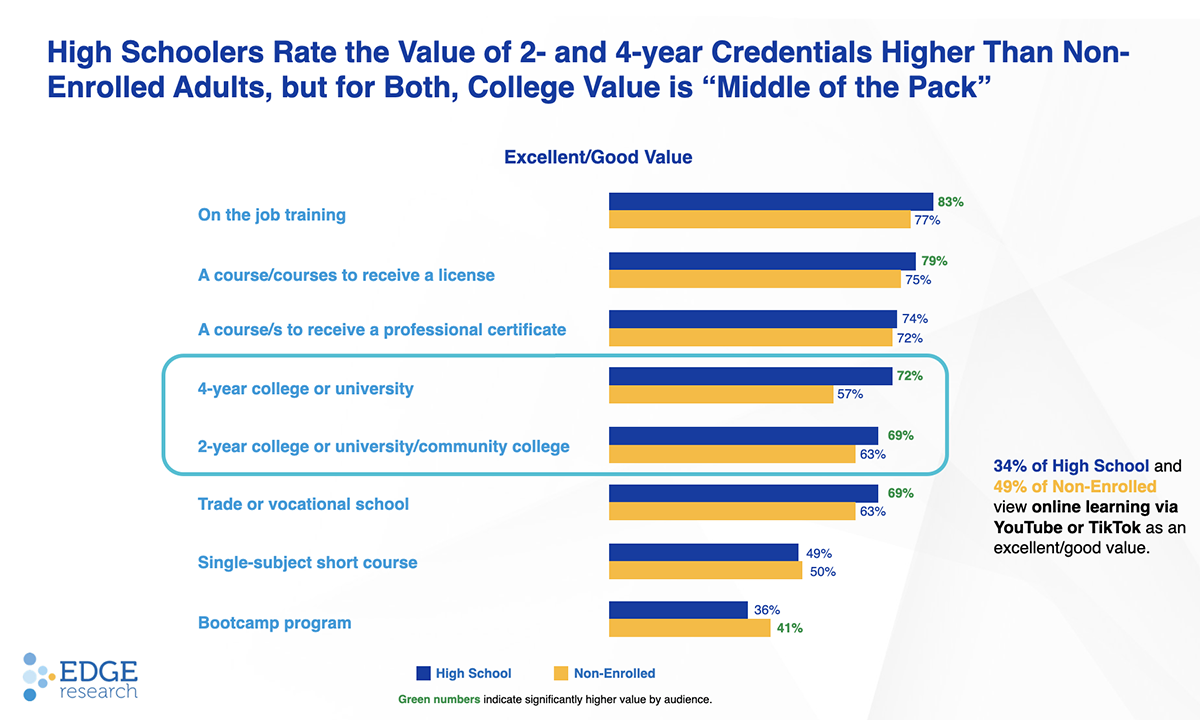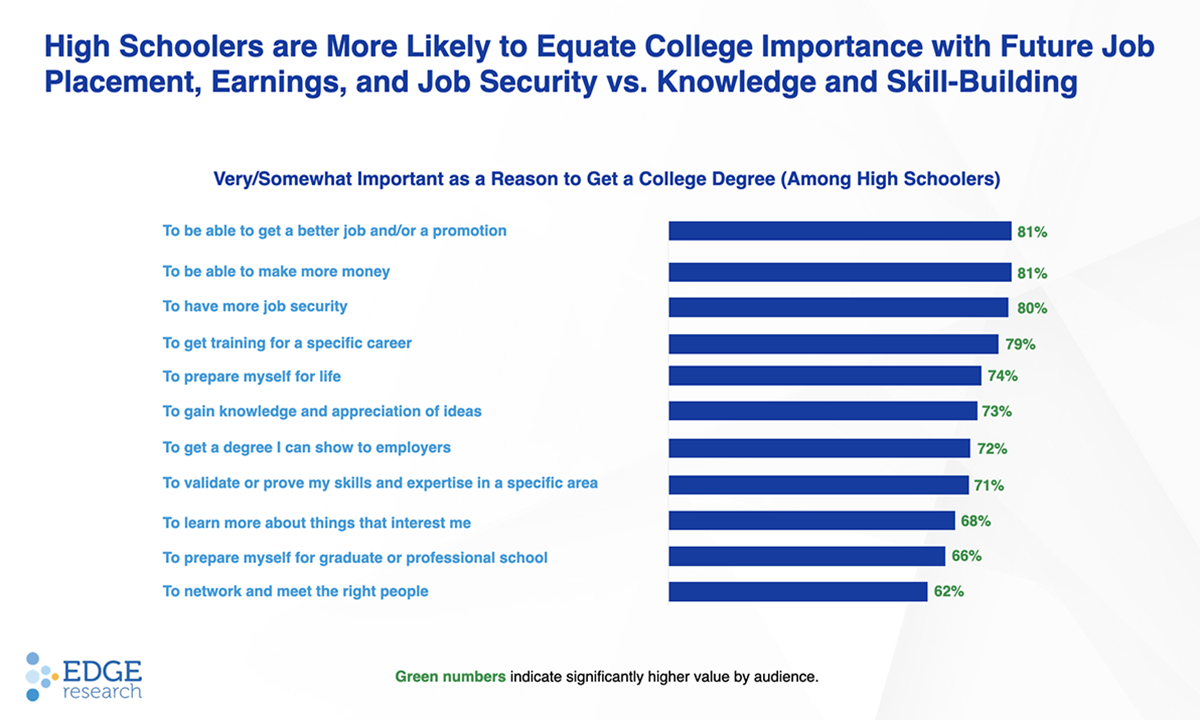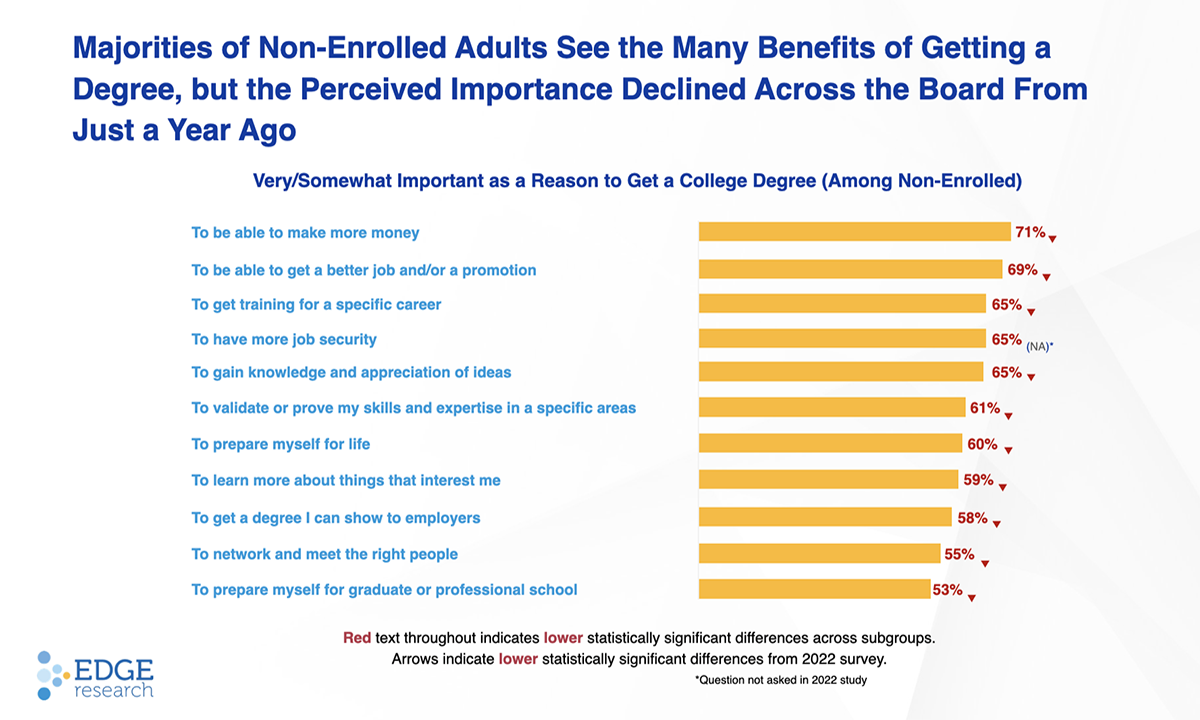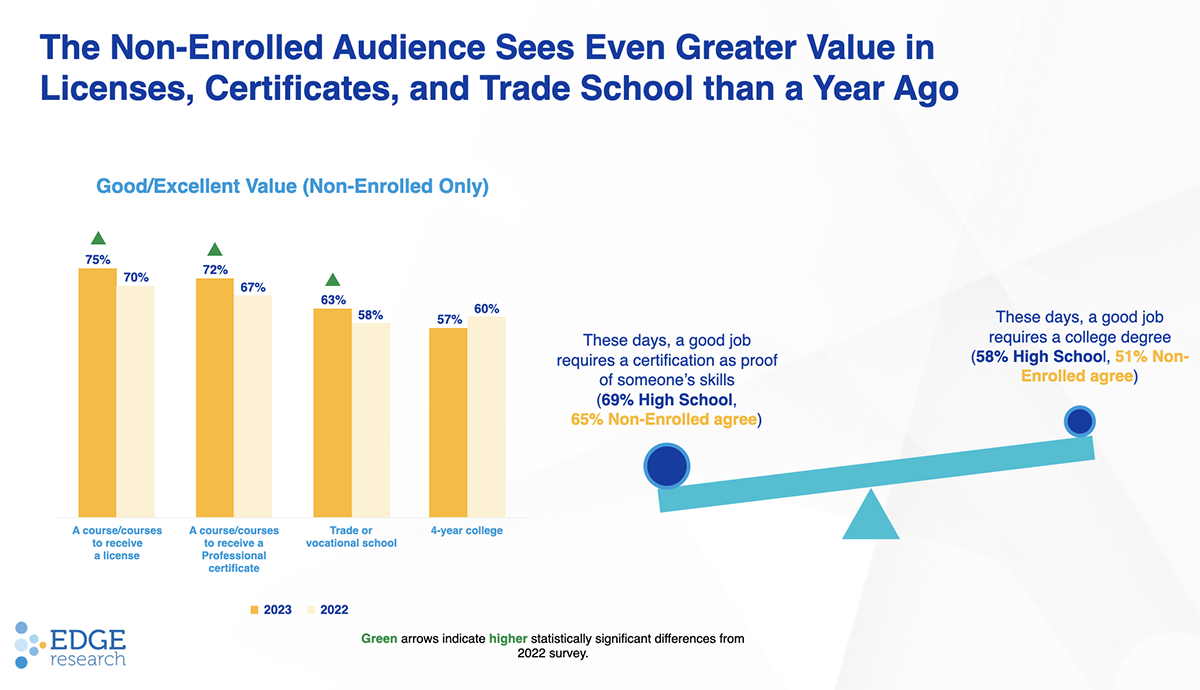On-The-Job Training Prevails as Students’ Disinterest in College Grows
Four things to know about students’ rising interest in immediate employment and apathy towards a college degree.

Get stories like this delivered straight to your inbox. Sign up for The 74 Newsletter
A new study has found more than 80 percent of high schoolers value on-the-job training over other postsecondary options, including a four-year degree — laying bare students’ interest in immediate employment and disdain for a college education.
The study, commissioned by the Bill & Melinda Gates Foundation, surveyed more than 1,700 high school juniors and seniors, with 83 percent saying they value professional development leading to a job compared to 72 percent who value a four-year degree.
In collaboration with HCM Strategists and Edge Research, the study also surveyed more than 3,000 non-enrolled adults ages 18-30 who either chose not to attend college or left their postsecondary program.
Both groups not only placed higher value in on-the-job training, but also licenses and professional certificates.
But a panel of experts came together yesterday to discuss the report’s findings — expressing concern over the growing apathy high schoolers and non-enrolled adults are showing in a college education.
“This is an acute concern to us particularly because our North Star is pretty simple,” said Patrick Methvin, director of pathways and postsecondary success strategies at the Gates Foundation, “to dramatically increase opportunity for the socioeconomic advancement of Americans and to eliminate race, ethnicity and income as predictors of student success.”
“Because we know a postsecondary credential is the most sure path to that, these attitudinal changes are a concern,” said Methvin.
Despite the empirical value of a college degree, Methvin said high schoolers’ waning trust comes from the negative media they consume, including the Supreme Court decision ending race conscious college admissions — which students view as an attack on campus diversity — along with crippling student loan debt.
But Methvin insisted a college education is still the most valuable option.
“People are living in very different worlds where they’re getting their information and what that’s doing in terms of influencing their choices,” Methvin said.
This data builds on a fall 2022 study that examined students’ declining enrollment in higher education.
“The postsecondary value narrative has been prevalent in policy wonk circles for some time, but the interesting thing from this research is we’re hearing those exact same words now from students themselves,” Methvin said. “They are talking about value. They are talking about [the return on investment] in ways they weren’t 10 years ago.”
Here are four key takeaways from the report:
1. High schoolers and non-enrolled adults value on-the-job training the most out of all postsecondary options.

Terrell Dunn, founding partner and consultant at HCM Strategists, said students value on-the-job training because they’re “shorter and cheaper options” that lead to well-paying jobs — such as careers in the oil and gas industry that offer six figure salaries without needing a college degree.
Adam Burns, chief operations officer and senior research analyst at Edge Research, said there’s “uncertainty” that investing in a college degree will help students reach their career goals.
“When it comes to paying for college, this is when the gloves come off [and] folks really seem to have a lot of problems,” Burns said. “They’re really lost in understanding how much college really costs, how financial aid works and even just managing when to fill out the forms and how to fill out the forms.”
2. High schoolers are more likely to align college importance with future job placements and income.

High schoolers that value a college education are focused on real life concerns such as earning more money and getting a better job — as opposed to learning or networking.
Pam Loeb, principal at Edge Research, said high schoolers main focus is finding the best pathway to a well-paying job.
“How do I find the right job once I’m finished? How do I choose what classes to take so I’m not wasting my time and money as I go through the college process,” Loeb said. “A concerted effort to engage and reach out to [high schoolers] is really needed.”
3. The importance of a college degree declined among non-enrolled adults compared to those surveyed in the fall of 2022.

The top reasons non-enrolled adults value earning a college degree aligns with high schoolers — to earn more money and get a better job.
But every reason for getting a college degree declined across the board for non-enrolled adults compared to those surveyed in the fall of 2022.
Burns said non-enrolled adults’ declining value stems from the “opportunity cost” of transitioning away from their full-time jobs to work towards a college degree they’re already skeptical about.
“They need help from someone who can connect the dots [and] make sure they can see the return on investment,” Burns said, such as ensuring they will secure an internship or full-time job after graduating.
4. Most non-enrolled adults see more value in licenses, professional certificates, and trade schools compared to a four-year degree.

About 75, 72 and 63 percent of non-enrolled adults respectively value licenses, professional certificates and trade or vocational schools — an increase of five percent compared to those surveyed in the fall of 2022.
But just 57 percent value a four-year school — a three percent decline.
“A lot of their concern is around making the right choices…at each juncture of their journey,” said Jessica Collis, director of advocacy and change management at HCM Strategists.
Dunn said non-enrolled adults might find value in a college degree if higher education institutions were more intentional about reaching out to them.
“They’re pretty rational in weighing their opportunity costs as they think about higher education,” Dunn said. “So although they’re skeptical…they’re also persuadable.”
Disclosure: The Bill & Melinda Gates Foundation provides financial support to The 74.
Get stories like these delivered straight to your inbox. Sign up for The 74 Newsletter

;)
